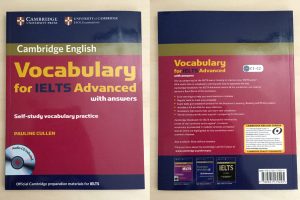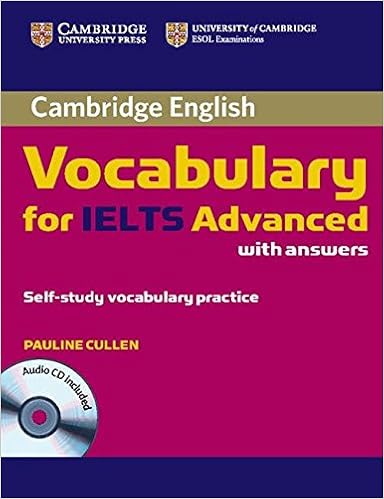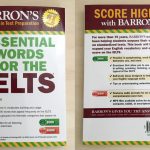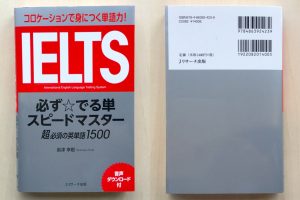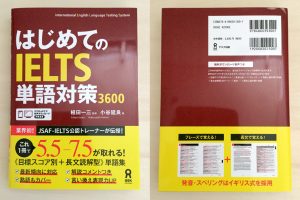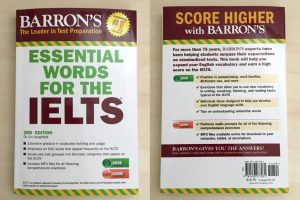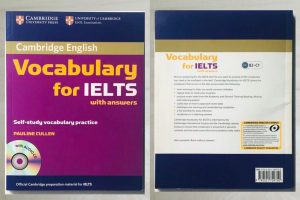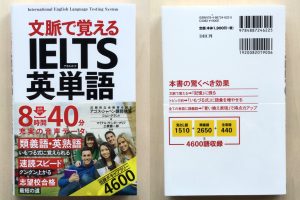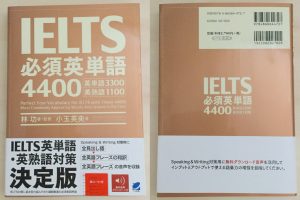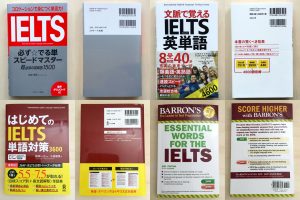ケンブリッジ社のIELTS単語帳上級
Contents
Map of the book Introduction IELTS Test summary
Unit 1 Human nature
Unit 2 Time for a change
Unit 3 No man is an island
Unit 4 Scientific discovery
Unit 5 Striving to achieve Test one
Unit 6 Powers of persuasion
Unit 7 Ways and means
Unit 8 State control
Unit 9 Natural history
Unit 10 Rocket science Test two
Unit 11 Progress
Unit 12 The latest thing
Unit 13 Urban jungle
Unit 14 Tackling issues
Unit 15 This Earth Test three
Unit 16 Energy efficient
Unit 17 Getting down to business
Unit 18 Law enforcement
Unit 19 The media
Unit 20 A matter of taste Test four
Unit 21 Learning vocabulary
Unit 22 IELTS Reading
Unit 23 IELTS Writing
Unit 24 IELTS Listening
Unit 25 IELTS Speaking
Test five
Answer key
Recording scripts
Wordlist
Acknowledgements
Map of the book
| Unit number | Title | Topics | Test practice |
| Unit 1 | Human nature | Character, psychology | Listening Section 4 |
| Unit 2 | Time for a change | Time, change | Reading |
| Unit 3 | Writing Task 1 | Individuality, community | No man is an island |
| Unit 4 | Scientific discovery | Chemistry, medicine | Reading |
| Unit 5 | Striving to achieve | Study, work | Speaking |
| Unit 6 | Powers of persuasion | Advertising, marketing | Reading |
| Unit 7 | Ways and means | Tourism, travel | Writing Task 1 |
| Unit 8 | State control | Government, society | Writing Task 2 |
| Unit 9 | Natural history | Animals, conservation | Reading |
| Unit 10 | Rocket science | Space, physics | Listening Section 4 |
| Unit 11 | Progress | Technology, design | Reading |
| Unit 12 | The latest thing | Fashion and trends, consumerism | Reading |
| Unit 13 | Urban jungle | Rural life, city life | Listening Section 1 |
| Unit number | Title | Topics | Test practice |
| Unit 14 | Tackling issues | Problems, solutions | Writing Task 2 |
| Unit 15 | This Earth | Natural phenomena, agriculture | Listening Section 3 |
| Unit 16 | Energy efficient | Energy, natural resources | Writing Task 2 |
| Unit 17 | Getting down to business | Management, personal finance | Reading |
| Unit 18 | Law enforcement | Crime, punishment | Writing Task 2 |
| Unit 19 | The media | Fame and the media, media bias | Speaking |
| Unit 20 | A matter of taste | The arts, personal taste | Reading |
| Reference section | |||
| Unit 21 | Learning vocabulary | Dictionaries, wordlists | |
| Unit 22 | IELTS Reading | Reading skills, question types | |
| Unit 23 | IELTS Writing | Writing Task 1, Writing Task 2 | |
| Unit 24 | IELTS Listening | Section 1 and 2, Section 3 and 4 | |
| Unit 25 | IELTS Speaking | Part 1, Part 2, Part 3 | |
Introduction
What does the book aim to do?
Cambridge Vocabulary for IELTS Advanced aims to extend and improve the accuracy of your academic vocabulary and help you prepare for the IELTS academic module. It introduces vocabulary through listening and reading texts that reflect the materials used in the IELTS test. Learning new words in context can help you to remember them and also helps you to understand their meaning. This book also gives you opportunities to practise new words so that they can become part of your active vocabulary.
Who is it aimed at?
The book is designed for upper-intermediate or advanced level students working alone who want to revise and extend their vocabulary. But it can also be used as part of an IELTS preparation course in the classroom, or set as homework by a teacher. It is also suitable for advanced general English students, or those preparing to study English for academic purposes.
What order should I do the units in?
You can work through the units in any order, but you should study all the units if you want to prepare thoroughly for the test and extend your vocabulary. You may want to start with a particular unit because it relates to a topic in your course book or because you have a particular interest in that area. Unit 21 provides a very useful introduction to learning vocabulary so it may be a good idea to look at this first.
How do I use the book?
It is best to work through a unit from beginning to end as one exercise may revise vocabulary from a previous exercise. The test practice sections provide further opportunities to extend your vocabulary, as well as giving you practice in the different sections of the IELTS test. The practice test materials are also useful for extending your vocabulary. Once you have completed the practice test questions, look at the reading and listening texts and focus on the areas where you made mistakes. Make a note of any vocabulary you do not know or anything that may be useful for you to use in the test.
How are the units organised?
There are 25 units. The first 20 units present and practise vocabulary based on academic topics. Each topic is divided into two sections. Each unit has three pages of vocabulary exercises based on listening, reading, writing and speaking materials similar to those found in the IELTS test. There is also a focus on pronunciation. In addition, there is a test practice at the end of each unit, which includes examples of tasks in the following papers: Academic Reading; Academic Writing; Listening and Speaking. These tasks provide useful practice and revision even if you are not taking the test. Following this introduction is a summary of what is in each part of the IELTS test. The last five units of the book provide a general guide to learning and using new vocabulary. Unit 21 gives useful tips on developing and using a dictionary. Units 22-25 focus on strategies for the individual sections of the test.
What is on the audio CD?
You need to listen to the audio CD to do the listening and pronunciation exercises in the units. The test practice listening tests are also on the audio CD. In the IELTS Listening test you hear everything only once so remember this when you replay the tracks.
How do I use the wordlist?
There is a wordlist for each unit at the back of the book. Some of the words may be specific to one topic area but many of them can be found and used in a wide variety of contexts. You may want to divide these lists up into smaller groups of words to learn at a time. It may be a good idea to study the wordlist before you begin each unit. Alternatively, your teacher might use the wordlist as a test or review at the end of each unit, or you could ask a friend to test you. You should be able to understand these words when you read or near them, but you should also try to extena yo active vocabulary by using them in your writing and speaking tasks. You should learn the correct spellings of words as well as any words that collocate with them.
How do I do the Writing test practice?
The Writing test practice questions give an opportunity to actively use the vocabulary from the unit. There are sample answers in the Answer key. These model answers can be used as a guide to organising ideas and using vocabulary accurately and effectively.
How do I do the Speaking test practice?
The Speaking test practice questions provide opportunities to actively use the vocabulary from the unit. In Part 2 of the Speaking test, you will be allowed to make notes, so think of any useful vocabulary you could use and write this down to help you as you talk. If possible, you should record your answers and play them back. Consider your pronunciation as well as the words you used. How could you improve your answer? Ask a friend or teacher for their comments.
When should I do Tests one to five?
There are five vocabulary tests. Each test assesses how well you have learnt the vocabulary from the previous five units. When you have finished five units, do the test and mark it using the answers at the back of the book. Highlight the questions you got wrong and go back to the units you need to look at again. If you are a more advanced student, you may want to take the test before you begin the units to see how much you already know. This may help to pinpoint your weak areas.
When should I use a dictionary?
The aim of the listening and reading activities in each unit is to give you practice in working out meaning from context. So you should try to do each exercise without a dictionary first unless you are instructed to use one. When you have finished, use the Cambridge Advanced Learner’s Dictionary or another suitable monolingual dictionary to look up any words you don’t know. You can also check your answers in the Answer key, but you may want to use your dictionary as a further check. Try to be aware of words you needto look up more than once. These are obviously key words for you to learn. Write them down with their meanings, together with any example sentences used in the dictionary.
How do I learn and revise vocabulary?
Some of the vocabulary in a unit will be new to you and some will be words you are familiar with, but cannot yet use accurately. Even if you feel you know a word already, you may be making collocation mistakes and using the incorrect preposition or verb. You might like to use a notebook and organise your vocabulary in the following categories:
・New words to learn
・Words I need to use more
・Words I often make mistakes with
・Topic words, e.g. The environment; Fuel; Energy; Work, etc.
Alternatively, you could simply highlight these words using a different colour highlighter for each category, e.g. a blue highlighter for topic words, a red highlighter for words you often make mistakes with, and so on. Unit 21 will help you develop good vocabulary learning techniques.
IELTS Test summary
Listening (approximately 30 minutes) mere are four sections and 40 questions. There are also ten minutes at the end to transfer your answers for the question paper to the answer sheet. In the IELTS Listening test, you will hear the recording once only Fach section is a little more difficult than the one before. Spelling is important but you can write your answers in capital letters if you think your handwriting is difficult to read. The test is divided up as follows:
| Section | What will I hear? | Example units |
| 1 | A conversation between two people, e.g. finding out information about travel | 8,13,24 |
| 2 | A monologue on a general topic, e.g. a radio broadcast | 20, 24 |
| 3 | A dialogue between two or three people in an academic context, e.g. discussing an assignment | 15, 16, 19, 24 |
| 4 | A monologue in an academic context, e.g. a lecture | 1, 2, 4, 5, 7, 10, 11, 13, 15, 16, 18, 24 |
There are ten questions for each section. Visit the IELTS website at www.ielts.org for a detailed description of each of the different question types. Study Unit 24 for Listening test strategies.
Academic Reading (1 hour) There are three reading passages and 40 questions. There is no extra time for the transfer of answers so write your answers directly on the answer paper. The texts are authentic and academic in nature. Examples can be found in Unit 2, 4, 6, 9, 11, 12, 17 and 20. Visit the IELTS website at www.ielts.org for a detailed description of each of the different question types. Study Unit 22 for Reading test strategies. Some candidates spend too long on the first passage and run out of time. Make sure you keep to the suggested times for each section.
Academic Writing (1 hour) There are two writing tasks, Writing Task 1 and Writing Task 2. You must answer both tasks. Task 2 carries more marks than Task 1. Study Unit 23 for Writing test strategies. The test is divided up as follows:
| Task | Timing | Length | What do I have to do? | Assessment | Example units |
| Writing Task 1 | 20 minutes | 150 words minimum | Describe visual information, e.g. a diagram, chart, graph or table. |
・Task achievement ・Coherence and cohesion ・Lexical resource ・Grammatical range |
3, 7 |
| Writing Task 2 | 40 minutes | 250 words minimum | Write a discursive essay. You may be asked to provide a solution; evaluate a problem; compareand contrast different ideas or opinions or challenge anargument or idea. |
・Task response ・Coherence and cohesion ・Lexical resource ・Grammatical range |
8, 14, 16, 18 |
Speaking (11 to 14 minutes)
In the IELTS Speaking test, you will be interviewed on your own by an examiner, who will record your response. You will be assessed on fluency and coherence, lexical resource, grammatical range and accuracy, and pronunciation. The interview has three separate parts and is divided up as follows:
| Part | Timing | What will I need to talk about? | Example units |
| 1 | 4-5 mins | Questions on familiar topics, e.g. hobbies; likes and dislikes; daily routine | 5, 13, 19 |
| 2 | 3-4 mins | You will be given an open booklet with a topic, e.g. ‘talk about a visit you made’ or ‘talk about something that interested you in the news. You need to talk about the topic for one to two minutes. You have one minute to write notes and think about your response before you begin. |
1, 5, 7, 12, 19 |
| 3 | 4-5 mins | The examiner will ask you more detailed and more abstract questions about the topic in Part 2, e.g. ‘How important is friendship?’ |
4, 5, 19 |
Remember to give long answers to the questions, display your knowledge of vocabulary and have clear pronunciation throughout. Study Unit 25 for Speaking test strategies. Features of the book
Cambridge English Corpus The ‘Error warning’ boxes are informed by the Cambridge English Corpus and deal with vocabulary which is known to cause problems for IELTS candidates at band 6.5 and above.
PARAPHRASE
Recognising and understanding paraphrase is important for the IELTS test. In order to test how well you can understand a listening or reading text, the questions in the IELTS test will present the ideas in the texts using different words to the ones you hear or read. Throughout this book you will find many exercises that help you to identify paraphrase.
Dictionary
In some exercises it may be useful to use your dictionary to check the vocabulary first, before you do the exercise. These exercises are marked with a dictionary icon. Look at Unit 21 if you need more help on how to use a dictionary.
COLLOCATION
Another feature of this book are the exercises on collocation. Collocation refers to the way words are used together. In the IELTS Speaking and Writing tests, you will be assessed on how accurately you can use vocabulary. This means choosing the correct words to use and combining them correctly. When you are learning new words, it is important to also learn the prepositions or verbs that should be used with them. The collocation exercises in this book will help to make you aware of this.



